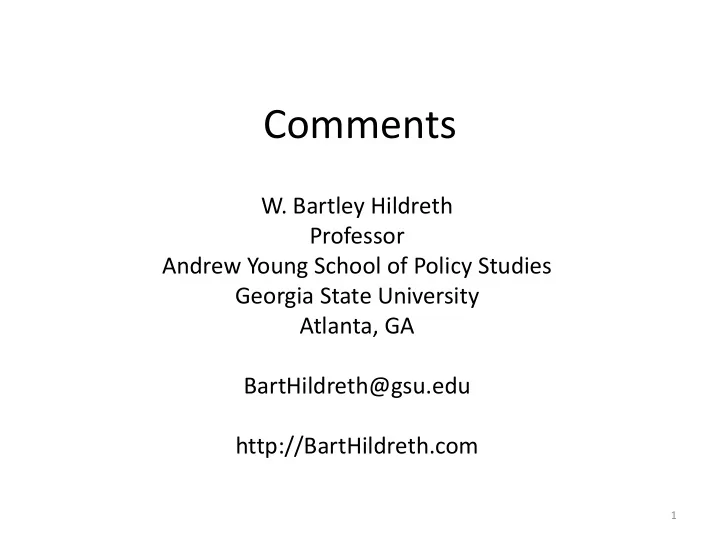

Comments W. Bartley Hildreth Professor Andrew Young School of Policy Studies Georgia State University Atlanta, GA BartHildreth@gsu.edu http://BartHildreth.com 1
Chapter 9 Municipal Bankruptcy • The current paper adds to Juliet Moringiello’s extensive work on municipal bankruptcy law • I use her writings and those of a few other law professors to provide a rough sketch of the debate over Chapter 9 provisions and their calls for change • They base their work on descriptive ‘case’ studies and normative principles instead of empirical work • That approach is understandable because there are so few general purpose municipal bankruptcies to draw upon • But, that is also the reason I see no basis for making changes in the law at this time 2
Chapter 9 Federalism Puzzle to Resolve Muni Problems Now If Debt “Fresh Start” Efficient Reorganization of Assets • • Respect state sovereignty Allow governance restructuring (similar to Chapter 11) • No interference with political • Provide more options (e.g., resolve powers without local consent fragmentation and make tax changes) • But: • Overcome undesirable strategic – No debtor restraint, only adjust debt behavior by local officials – State can’t impose binding plans of • Allow continuing role to monitor the adjustment on nonconsenting confirmation plan creditors • Focus on eligibility (front-end) and – Same officials remain in control plan confirmation (back-end -- ‘veto’) – Not change habits or resolve fragmentation of decision-making – Not address the root causes Pre In Formal: Informal: Judicial Give Judges Management as in State as State More Powers “Detroit Blueprint” Gatekeeper Oversight 3
Creditor Priorities, or “Who’s Preferences Count?” PROPERTY CONTRACTUAL Secured claims: • Grant of security carries a • Revenue debt - only if sufficient remedy against the funds going forward (non- property interest pledged recourse) • • Estate created of all Liens (as in Rhode Island?)* – Not: if only “springs into effect” debtor’s interest in property – Genuine: if matter outside Chp.9 • Fair and orderly distribution (See paper at Brandeis 2014) Unsecured claims: of property • Bond lawyers vs. Bankruptcy • But public assets are not attorneys; Detroit UTGOs available to creditors • “Worthy” vs. “Unworthy” -these need to be fleshed out more *David Skeel in U. Illinois L.R. (2015) 4
Selective References • Juliet M. Moringiello – “Municipal Capital Structure and Chapter 9 Creditor Priorities” – “Chapter 9 Plan Confirmation Standards and the Role of State Choice”, 37 Campbell Law Review 71 (2015) – “Goals and Governance in Municipal Bankruptcy,” 71 Washington & Lee Law Review 403 (2014) • Melissa B. Jacoby, “Federalism Form and Function in the Detroit Bankruptcy,” 33 Yale Journal on Regulation 55 (2016) • Clayton P. Gillette – “Can Public Debt Enhance Democracy?” 50 William & Mary Law Review 937 (2008) – “Dictatorships for Democracy: Takeover of Financially Failed Cities,” 114 Columbia Law Review 1373 (2014) – and David A. Skeel , Jr. “Governance Reform and the Judicial Role in Municipal Bankruptcy,” 125 Yale Law Journal 1150 (2016) • David A. Skeel , Jr. “What is a Lien? Lessons from Municipal Bankruptcy,” 2015 University of Illinois Law Review 675 (2015) • Tima T. Moldogaziev, Sharon N. Kioko, and W. Bartley Hildreth, “Bankruptcy Risk Premium in the Municipal Securities Market” (2014 version; revised later), http://cdn.bondbuyer.com/media/pdfs/BBrandeis14-Tima-paper.pdf 5
Recommend
More recommend